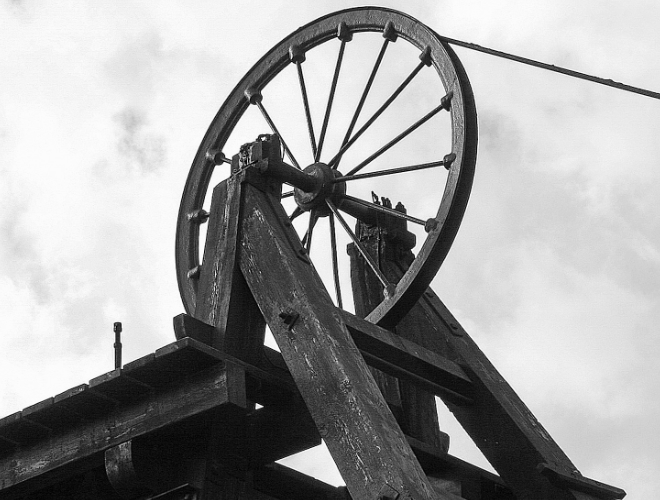Pub history
The Kingswood Colliers
Opened in March 2000, this pub was purpose built on the site of Kingswood Market. It is named after the ‘Great Number of Under Ground Workmen’ who lived and laboured in this area. In 1739, the great Methodist preacher John Wesley wrote: “Few persons in the West of England have not heard of the colliers of Kingswood.” The city of Bristol was wholly dependent on the miners of Kingswood Chase for its coal supplies.

Text about pin- and boot-making

The text reads: From the 17th to the 19th centuries, the manufacture of pins was an important industry in the Kingswood area. Once made by hand from lengths of brass wire, pins were very expensive, and some husbands gave their wives ‘pin-money’ to buy them.
Three names particularly associated with local pin-making are William Champion, Robert Charlton and Thomas Rawbone. Champion’s works at Warmley, established in 1746, employed around 800 people onsite, as well as outworkers. Charlton transformed the industry by introducing machinery. He also built a school, used as a chapel on Sundays, for his workers and their families.
Thomas Rawbone ran his works for 30 years until he died in 1896, when the factory doors closed for 40 years. When the building was reopened, machines were found loaded with wire, with boxes of pins beside them, waiting to be sealed. It became known as the ‘Rip Van Winkle Factory’.
The boot-making trade, or snobbing, began as a cottage industry, and sheds and outhouses used by outworkers still survive in local gardens.
Factories included Lovell’s Challenge Works, Derham’s, Allen & Prior’s, Pratt’s, Pow’s, Aaron Johnson’s Britannia Works, and Moon’s. The industry began to decline in the 1920s with the loss of the Irish market, and after the Second World War, GB Britton and the British Shoe Corporation came to dominate the trade.
A selection of photographs of Kingswood colliers



Text about Douglas motorcycles

The text reads: Douglas motorcycles were made at Kingswood for some 50 years. The first machines were based on the Fairy model, taken over in 1907 from the bankrupt Bristol ‘Light Motors’ company, on the insistence of William Wilson Douglas, son of the firm’s founder.
Douglas Brothers Engineering was set up in the 1880s as a foundry, producing boot-making machinery, and street furniture such as lampposts and manhole covers.
Success came to Douglas Motorcycles after they set a Land’s End to John O’Groats record in 1910, followed by good performances in the next years’ Isle of Man TT Races.
By 1923, Douglas motorcycles held 150 British and World records. The late 1920s saw them take advantage of the new craze for dirt-track racing, but the firm collapsed in the depression of the 1930s and was taken over by the British Aircraft Company.
Having manufactured trucks, stationary engines, and Spitfire parts during World War II, Douglas resumed motorcycle production in 1947. They produced Vespa scooters under licence from 1953, and their final flourish the following year was the Dragonfly.
Text about preachers in Kingswood

The text reads: The wild and uncouth colliers of Kingswood were finally tamed by Methodism. The founder of the movement, John Wesley, claimed in 1769 that the former savages had been transformed into ‘a humane and hospitable people, full of love to God and man’.
The first of the Methodist ‘field preachers’ to brave the weather and the colliers of Kingswood was George Whitefield.
He had been banned from local Church of England pulpits after showing an embarrassing enthusiasm for spreading the Christian message to the lower classes.
Standing on a table, Whitefield addressed a crowd of around 4,000 which had gathered on Hanham Mount in February 1739. He was followed a month later by John Wesley, who wrote in his journal:
‘I could scarce reconcile myself to this strange way of preaching in the fields’.
The many Methodist and Wesleyan Chapels built in Kingswood show how readily the ‘ungovernable’ colliers received the message they heard.
A practical creed, Methodism cared for both body and soul. John Wesley set up a school for poor children, a home for widows, and a loan society. He also compiled a book of herbal (or free) remedies, Primitive Physic.
External photograph of the building – main entrance






